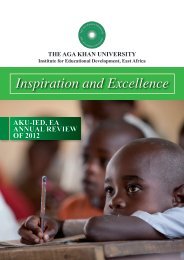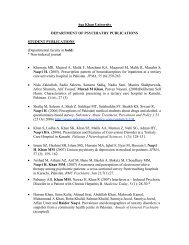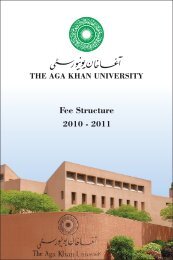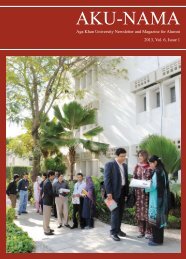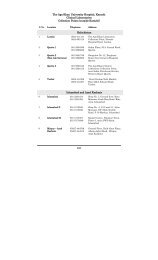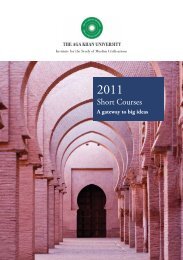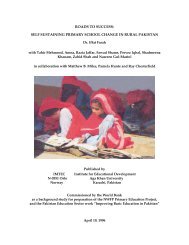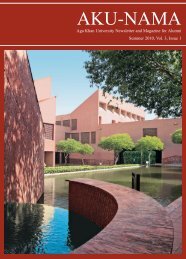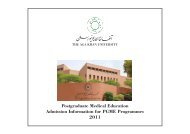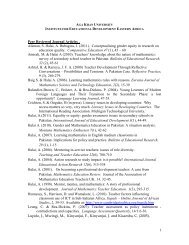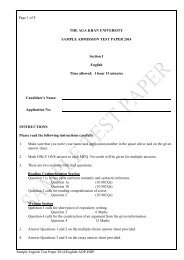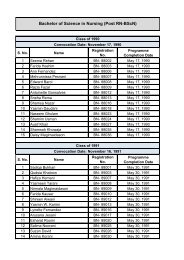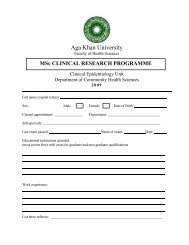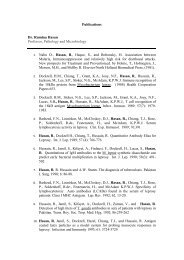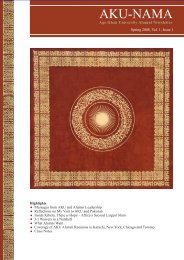Winter 2011, Vol. 4, Issue 2 - Aga Khan University
Winter 2011, Vol. 4, Issue 2 - Aga Khan University
Winter 2011, Vol. 4, Issue 2 - Aga Khan University
You also want an ePaper? Increase the reach of your titles
YUMPU automatically turns print PDFs into web optimized ePapers that Google loves.
Beyond Medicine<br />
Dr Saud Anwar, MBBS ’91 is a well-known pulmonologist and<br />
critical care specialist who has been actively involved in social<br />
service throughout his career, volunteering with many national and<br />
international organisations involved in education and health care. In<br />
<strong>2011</strong>, he was elected Town Councillor for South Windsor, Connecticut.<br />
What would you see as a highlight<br />
of your medical career?<br />
The highlight of a medical career<br />
is not one: it is every day, in every<br />
patient. Solving a problem at a<br />
particular moment in time and of a<br />
particular individual be it medical or<br />
non-medical is the highlight for that<br />
moment. Whether it is holding the<br />
hand of a family member who has<br />
just lost a loved one or identifying<br />
the right medicine for the right<br />
disease or providing support to a<br />
patient who is unable to take care of<br />
their own health – these are some of<br />
my daily highlights.<br />
The best parts of medicine are<br />
the moments that you cannot bill<br />
for or charge for or get paid for, in<br />
financial terms.<br />
I remember taking care of<br />
a family in Haiti. A 27-year-old<br />
woman with three young girls came<br />
to see me. This woman had lost her<br />
entire family, except her five-yearold<br />
daughter, in the quake; the other<br />
two girls were her nieces who had<br />
also lost their whole families. Yet<br />
the four of them had come together<br />
and were supporting and taking care<br />
of each other. The little five-year-old<br />
made sure that her new-found sisters<br />
had a seat to sit on and were examined<br />
by me before her. Their instinct<br />
to care for each other after such a<br />
terrible event is something I value to<br />
this day as a lesson well learnt.<br />
You are a doctor, a politician,<br />
a teacher, an advocate for<br />
human rights and a volunteer.<br />
How are you taking all these<br />
roles forward?<br />
Being a physician actually is an<br />
attitude, a mind-set and a way<br />
of life. We are advocates for our<br />
patients and we volunteer at times<br />
to take care of our patients’ needs.<br />
We, at the same time, have to start<br />
to understand that we have a role<br />
to play in taking care of the health<br />
issues in our society.<br />
When one identifies abnormal<br />
patterns of behaviour or existing<br />
policies which would have an<br />
impact long-term on the health of<br />
communities and society, one has<br />
to step in and see what role we can<br />
play, from a preventive, a diagnostic<br />
or even a therapeutic perspective.<br />
So, being a physician, having an understanding<br />
of the disease processes<br />
in the human body and then putting<br />
the community health into perspective<br />
allows one to play various roles<br />
in the whole spectrum of individual<br />
and community health care.<br />
I have learnt the art of time<br />
management to some degree. I have<br />
a list of goals and things that need<br />
to be completed on a specific day. I<br />
do not take any lunch breaks or any<br />
other breaks and try and complete<br />
the tasks within my day. After<br />
taking care of patients’ needs, I am<br />
blessed to have an understanding<br />
family who do let me complete my<br />
planned goals for the day. I do take<br />
planned time off from the medical<br />
profession on a weekly basis and<br />
that is the time I make sure that my<br />
other responsibilities are fulfilled to<br />
the best of my capacity.<br />
I believe in creating efficient<br />
systems which enhance one’s<br />
capacity and personal bandwidth.<br />
You’re engaged with a number of<br />
charitable organisations operating<br />
globally. What have you seen<br />
them accomplish?<br />
My work is focused on developing<br />
models for others to follow which<br />
can increase scale and have an<br />
opportunity of impacting policy<br />
which can translate into making a<br />
bigger difference.<br />
Take the example of the South<br />
Windsor Haiti School project which<br />
involves an integrated approach to<br />
the education, nutrition and health<br />
care of preschool children and<br />
provides free services for all three.<br />
If this works, we will have created<br />
a model, which could be adopted by<br />
towns in the United States, building<br />
a long-term sustainable relationship<br />
and emotional understanding<br />
between two cultures.<br />
Look at Ibtida, the volunteerbased,<br />
non-religious, non-political,<br />
non-profit organisation that a group<br />
of us set up in 2003 working to<br />
provide quality education to underprivileged<br />
children in the rural areas<br />
of Pakistan. We believe that the only<br />
way to break the vicious cycle of<br />
poverty and ignorance is through<br />
education. Our investment in these<br />
children’s future – with appropriate<br />
curriculum – is allowing them<br />
not only to be educated, but also to<br />
become enlightened individuals.<br />
What have been some of the<br />
challenges faced by the American<br />
Muslim Peace Initiative, a group<br />
that you founded and co-chair?<br />
The challenges in the world with<br />
respect to understanding the<br />
diversity of faiths and the challenges<br />
with respect to harmony have<br />
increased significantly.<br />
The challenges faced by our<br />
initiative have been increasing the<br />
scale of our activities and having<br />
an infrastructure is important as all<br />
the work is volunteer-based. You<br />
have to remember that the people<br />
who are spreading a negative mindset<br />
about Muslims and Islam have<br />
more resources than the ones who<br />
are working on the positive end of<br />
the spectrum. Our job is to try and<br />
keep pace with the needs and this<br />
challenge is an ongoing process.<br />
What activities have you engaged<br />
in as Town Councillor for South<br />
Windsor, Connecticut?<br />
We are nine members who oversee<br />
the governance, policies and budget<br />
of the town. During my term, I<br />
have been able to help decrease the<br />
polarisation within the two political<br />
parties in town as I have served<br />
as a person who supports the right<br />
ideas and policies regardless of who<br />
recommends them – my party, the<br />
Democrats, or the Republicans. We<br />
need to develop an understanding<br />
of issues, rather than trying to score<br />
points, and so I feel that I have<br />
brought a common sense approach<br />
towards the challenges that lie<br />
ahead of our community.<br />
In June, at the completion of<br />
the budget process for the town,<br />
many of my fellow council<br />
members stated that this budget vote<br />
passed because of my effort to bring<br />
people together and to negotiate<br />
common ground.<br />
As a physician, I have used my<br />
training in disease and symptom<br />
approach to tackle some of the challenges.<br />
For example, I am the first<br />
person in our community to study<br />
the baseline characteristics, issues<br />
and needs of senior citizens in the<br />
community, to assess and identify<br />
ways of helping them better.<br />
Does one need a particular<br />
attitude in order to succeed?<br />
The definition of success needs to<br />
be broader. It is a continuous effort<br />
of improving oneself, both within<br />
and without. For aspiring doctors,<br />
one should understand that the<br />
most important time in your life<br />
is the moment you are living in.<br />
One cannot control the past, the<br />
future is just a mystery that we do<br />
not know about, the present time is<br />
our gift to accept.<br />
Making the right choices by<br />
fulfilling our responsibilities with<br />
complete honesty spells success.<br />
It’s Time for<br />
Afghanistan<br />
Setting the tradition, <strong>Aga</strong> <strong>Khan</strong><br />
<strong>University</strong> Programme office in<br />
Afghanistan organised the first AKU<br />
alumni reunion at the Kabul Serena<br />
Hotel on June 28, <strong>2011</strong>. Presided<br />
over by Dr Rozina Karmaliani,<br />
Interim Dean of the School of<br />
Nursing, the event brought together<br />
nearly 30 alumni including 18<br />
from Pakistan and Tajikistan<br />
who are currently serving in<br />
Afghanistan, their spouses as well as<br />
representatives of AKU’s leadership.<br />
The <strong>University</strong> alumni are<br />
serving in important positions in<br />
the health and education sectors<br />
and contributing significantly in<br />
the redevelopment of Afghanistan.<br />
They are participating in policy<br />
making, institute building, capacity<br />
development and training of human<br />
resources, standardisation of health<br />
and education systems, and research<br />
in the country.<br />
Individual alumni introduced<br />
themselves and acknowledged the<br />
fact that the <strong>University</strong> has helped<br />
shape their careers, by virtue<br />
of which they are now serving<br />
Afghanistan in various capacities.<br />
Dr Karmaliani appreciated<br />
the valuable contribution of the<br />
<strong>University</strong>’s alumni in Afghanistan<br />
and also shared highlights of<br />
AKU initiatives and programmes<br />
worldwide.<br />
Dr Parvez Nayani, Head AKU<br />
Programme in Afghanistan,<br />
Mr Lee Hilling, Chair of Provisional<br />
Operating Committee, Mr Nadeem<br />
Mustafa <strong>Khan</strong>, Director General and<br />
CEO, AKUH Asia, and Mr Aziz Jan,<br />
CEO and Director General, French<br />
Medical Institute for Children, also<br />
shared their views and thoughts with<br />
the alumni. The event ended with a<br />
vote of thanks by Dr Karmaliani.<br />
Mukhtar Ali <strong>Khan</strong>, Instructor,<br />
<strong>Aga</strong> <strong>Khan</strong> <strong>University</strong> Programme<br />
in Afghanistan.<br />
1 2 1 3



